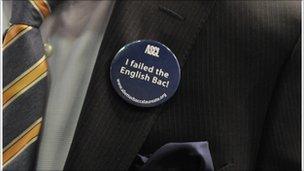Heads wear badge of protest against the English Bac
- Published

Dissenting heads wear the badge of failure proudly.
The English Baccalaureate has been controversial from the start and it proved no less a bone of contention at the annual conference in Manchester of the Association of Schools and College Leaders (ASCL).
To make a point, eligible heads and deputies have been sporting a badge at the conference: "I failed the English Bac!" Around 650 badges have been given out here.
Announced by Education Secretary Michael Gove in the autumn, the new English Bac benchmark measures how many pupils in England achieved five GCSEs at grade C or above in English, maths, a language, two sciences and either geography or history.
Head teachers were furious. It was not a qualification in itself and they were not consulted on it. Worse still, they were being judged on something they had no knowledge of.
Schools' performances by the new benchmark were published in this year's league tables in January, but were based on exams sat last June.
"It's just the wrong way to do things," said ASCL general secretary Brian Lightman.
"It was measuring schools against something that no-one had said we should be aspiring to - it's setting schools up to fail."
Mr Lightman, who has been wearing the badge himself, because he only did one science - biology - said the prescriptive measure flew in the face of the coalition's commitment to greater freedom and autonomy.
"Any subject not on the list will automatically be devalued. All of this leads to a blame culture which devalues, demoralizes and denigrates the profession," he added.
Sporting his badge, Ian Saunders, deputy head of The Manor School in Mansfield Woodhouse, said: "The retrospective introduction of it blind-sided us - how can we prepare for something we didn't know was coming?
"Our Bac was very low, but why wouldn't it be?"
Mr Saunders said the measure flew in the face of personalized learning and was old-fashioned.
"But once you put a performance table in place, people want to be high on that table, whether it's any good or not."
Mike Westerdale, principal of Parkwood Academy in Sheffield, regrets the lack of consultation over what subjects were included.
"The biggest concern I have is the way in which the subjects in the English Bac have been decided upon. Who decided?
"I'm not gearing up my curriculum for it, but I'm making young people aware that it's out there because it could close doors in the future."
'I love it'
Speaking to delegates at the conference on Friday, Education Secretary Michael Gove defended the introduction of the English Bac, saying it would raise the level of expectation on pupils.
"The English Bac is designed to say to the whole education system - 'how can we raise our game?'"
Mr Gove said the choice of subjects for the benchmark was driven by what was happening in other countries and claimed the public here wanted the same.
"It's given the public a measure that reflects what many of them are demanding."
But could he be swayed by the head teachers' concerns, and scrap it?
"I love it the way it is, I'm not planning to change anything at the moment," he said.
'Wrong and unforgiveable'
But his enthusiasm was not shared by the shadow education secretary, Andy Burnham, who described the English Bac as highly unfair and a 1950s measure.
Speaking at the conference on Saturday, Mr Burnham said it would not stretch the brightest nor engage those pupils who were struggling.
"Two hundred and seventy schools got zero under the English Bac - it's as though those schools are doing nothing of value.
"It's a wrong and unforgiveable slur on the people working on those schools."
Mr Burnham said the English Bac failed to value the arts, technology and economics.
He accused Mr Gove of planning to use the new measure to show how schools had improved under his watch - and the best way to do that is to show them up at the outset.
Mr Burnham did not let on whether or not he had met the standard, but apparently he took a handful of badges to hand out to the Shadow Cabinet.
- Published12 January 2011
- Published12 January 2011
- Published12 March 2011
- Published11 March 2011
- Published3 March 2011